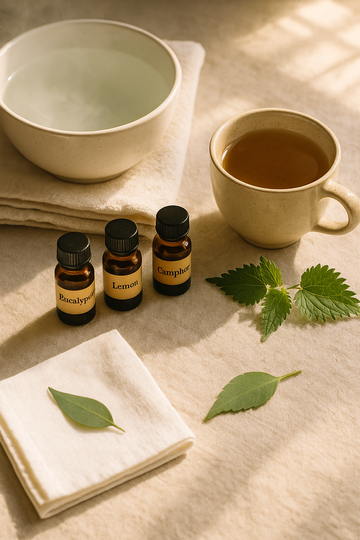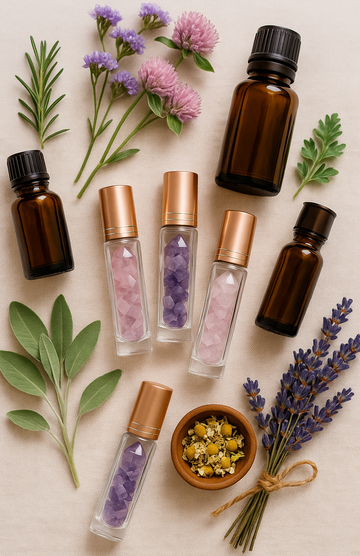Hay Fever and Herbs
The Scent of Relief: Aromatic Remedies for Hay fever Season (with a nod to Grandmother’s Medicine Cabinet)
There are a quite a few aromas that instantly take me back to childhood — and one of them is the sharp, minty-green scent of eucalyptus oil dabbed onto a cotton hanky.
Hay fever season was a ritual in itself when I was little. As soon as the flowers were out and the grasses were waving, so too were the sniffles, watery eyes, and endless sneezing. My grandmother, always the practical type, had her own little toolkit for this time of year — and it didn't involve packets of pills or sprays. It was a world of lemon slices, herbal teas, and those little glass bottles with handwritten labels and mysterious smells.
For hay fever, she always reached for eucalyptus, camphor, and lemon. I remember her warming a bowl of water on the stove and adding just a drop or two of each — the whole kitchen would fill with that crisp, nose-clearing steam. I’d lean over it with a towel over my head like a little tent, breathing it in while she brewed fresh nettle tea on the side.
To this day, I still associate those scents with clarity, comfort, and being cared for.
Why These Aromas Work (and the Science Behind Them)
It turns out Grandma’s instincts were spot on. Eucalyptus oil, particularly from Eucalyptus globulus, contains 1,8-cineole — a powerful compound known for its anti-inflammatory and expectorant effects. It helps open the airways and ease that congested, heavy feeling in the head and sinuses.
Camphor, often found in older-style balms and chest rubs, has a long history in herbal medicine. It's both a decongestant and a mild local anaesthetic, which can help reduce the irritated, itchy sensations hay fever brings — especially around the nose and eyes. Used in small doses, I found it incredibly effective at promoting easier breathing.
Lemon essential oil, bright and uplifting, is rich in limonene, a compound with antioxidant and anti-inflammatory properties. It gives the immune system a little gentle encouragement and helps clear sluggish lymph, which can be especially helpful when pollen levels are high.
As for nettle tea — that underestimated herbal hero — it contains natural antihistamines and high levels of vitamin C, both of which support the body’s ability to regulate allergic reactions. It’s not a quick fix, but taken regularly during hay fever season, it may reduce symptom severity over time.
My Go-To Hay fever Steam Blend
If you’re struggling with pollen at the moment, here’s a simple, effective remedy that nods to my grandmother’s old methods:
-
1 drop eucalyptus (Eucalyptus globulus)
-
1 drop lemon (Citrus limonum)
-
1 drop camphor (Cinnamomum camphora)
Add to a bowl of hot (not boiling) water. Drape a towel over your head and breathe deeply for 2–3 minutes. Close your eyes, take your time, and feel your whole head begin to clear.
(Always keep your face a safe distance from the steam and use discretion if you have sensitive skin or respiratory conditions.)
And for Inside-Out Support: Nettle Tea
You can find dried nettle leaf at most herbal shops, or even forage it if you know what you’re doing (I don't forage but I am assured gloves are essential!). A cup of nettle tea once or twice a day during hay fever season can offer gentle, cumulative support.
To make:
-
Add 1–2 teaspoons of dried nettle leaf to a teapot or infuser
-
Pour over freshly boiled water
-
Steep for 5–10 minutes
-
Strain and sip, with a slice of lemon if you fancy
There’s something deeply reassuring about these old ways — the scent of eucalyptus rising in the air, the quiet moment of stillness over a steam bowl, the herbal earthiness of nettle on the tongue. These little rituals may be simple, but they remind us that nature has always offered us comfort — and that there is power in pausing, inhaling, and tending to ourselves gently.
If you’d like help creating your own seasonal remedy blends, or you’re curious about how essential oils can ease your day-to-day discomforts, I’m always happy to help. Let’s keep those sneezes at bay, one scented ritual at a time.
Warmly,
Fiona x
fiona@themorganacademy.com








